“Will have half a meal, but a full education”: How 4 UP Girls Broke Shackles to Study
Uttar Pradesh's Kushinagar has been considered one of the most backward regions in India. But thanks to the efforts of these girls, it is now emerging as a model example of community-led social transformation.
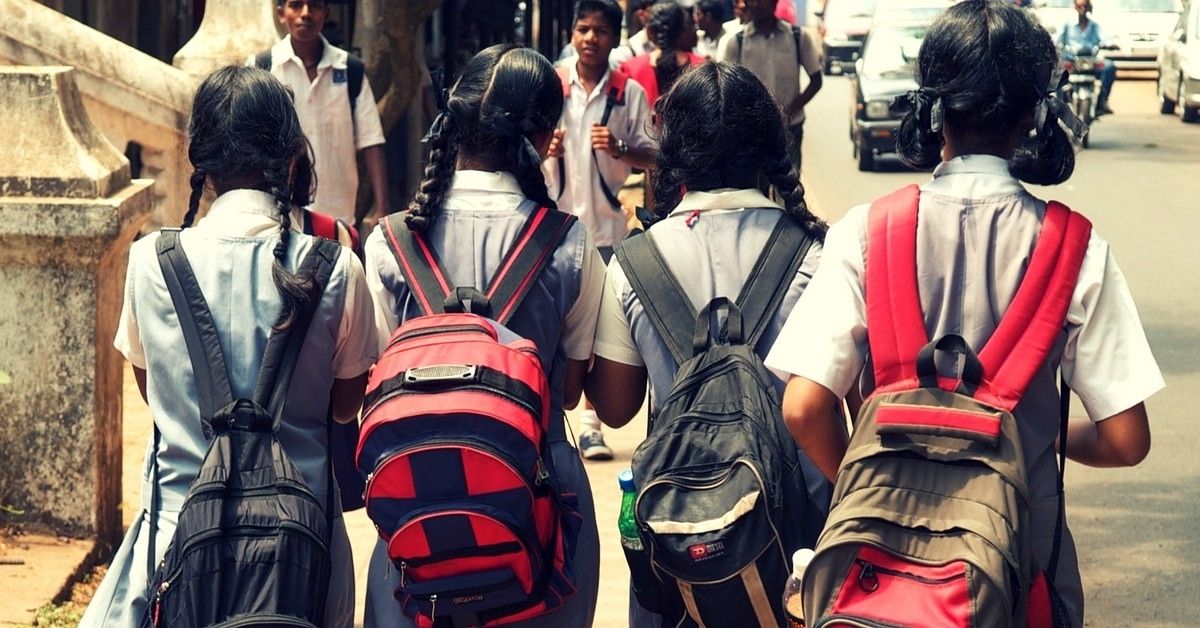
“We will eat half a chapati, to afford studying in a school,” a group of young girls scream in unison, as they rally through the labyrinthine alleys of two villages, Shahpur Khalwapatti and Mishroli, in Kushinagar, Uttar Pradesh.
Led by four girls—Rinku Kumari, Nisha, Puneeta and Pinky Kumari—this school-enrollment movement of sorts has brought about a sea change in a region that is historically known to have been suffering from acute poverty and gender-based discrimination.

Similar Story
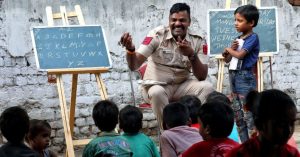
‘I Started With 5 Kids, Now I Teach 105’: Delhi Constable’s Free School Helps Kids Dream Big
Doing odd jobs around Delhi, these kids were deprived of education and opportunities. When constable Than Singh saw their plight, he jumped to action and started teaching them for free. Here’s their story.
Read more >
Supported by a local NGO—Samudaik Kalyan Evam Vikas Sansthan (Community Welfare and Development Society) also known as SKVS—these young volunteers are striving to take control of their future and empower the young generation by advocating for an equal opportunity of education. Thanks to their efforts, Kushinagar, a place that was considered one of the most backward regions in India, is now emerging as a model example of community-led social transformation.
Fighting discrimination, one student at a time
“The majority of the population in this region comes from a tribal Musahar community. Extremely marginalised, this community has been suffering for decades. They don’t have any land to cultivate or much education to allow other opportunities. Even the land on which their houses are built do not belong to them. Historically known to be the ‘rat-catching’ community, they are known to survive on a diet of rats because of the acute level of poverty. This has also contributed in the marginalisation and discrimination against the community,” says Amarnath, a local social worker with over a decade of ground experience in this area.
He along with SKVS began working towards empowering the Musahar community in 2009. But soon their findings led them to a conclusion that along with caste-based discrimination the region was also plagued with gender-based discrimination and low-literacy, both of which contributed to their poor socio-economic status.
He adds that almost 5 years ago, SKVS found that out of an approximate population of 40,000 people in Kushinagar, only 4,000 had managed to study beyond Class 8. This discovery pushed for a consolidated effort to bring about grassroots change, thus ushering in the inception of a localised intervention to educate the youth, especially girls.
“Education and skill training are two of the ways adopted by SKVS to help them come out of the cycle of poverty and achieve social equality,” says Amarnath who works as the programme coordinator of SKVS. Led by seven Dalit women, this Kushinagar-based voluntary organisation has advocated various issues like land rights, women’s rights and child rights, as avenues to enable community development and empowerment.
School Chalo Abhiyan
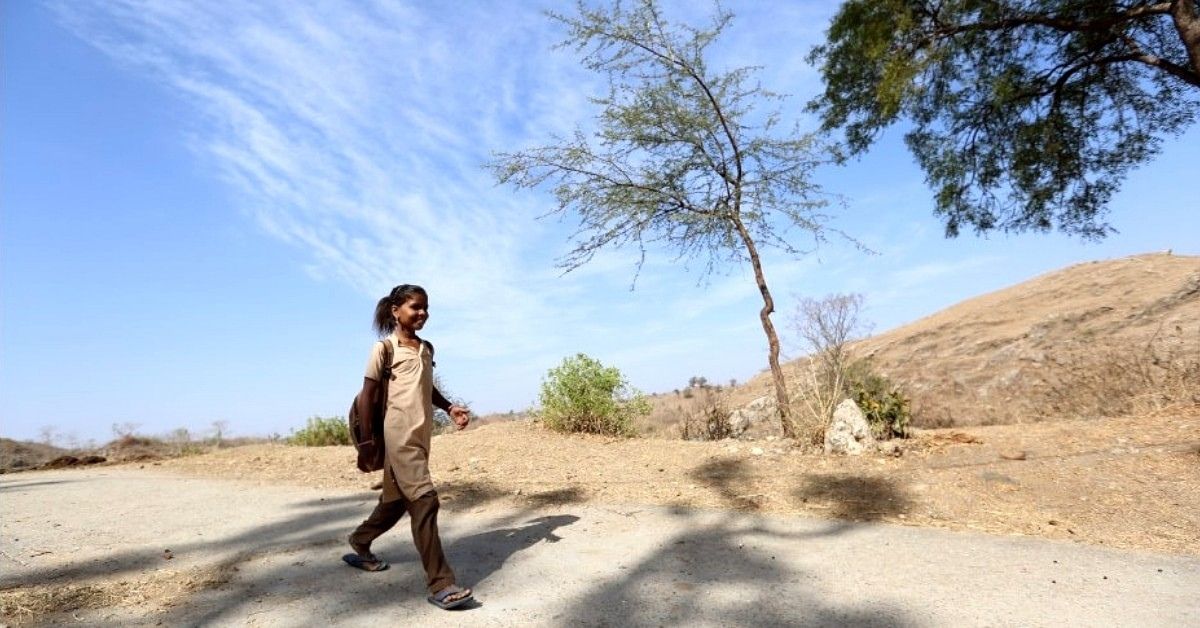
Today, young girls across Shahpur Khalwapatti and Mishroli villages look up to the Rinku, Nisha, Puneeta and Pinky as role models who fought against centuries-old social norms to ensure a better and more equal future for girls.

Similar Story
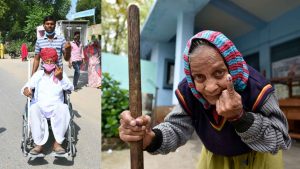
Elections 2024: How Can People With Disabilities Vote From Home in India
The Rights of Persons with Disabilities Act 2016 mandates accessibility of the electoral process for every Indian with a disability. Here’s a step-by-step guide on how you, or someone you know, can exercise their voting right.
Read more >
With SKVS at the helm, these girls formed two Kishori Sangathans or young women’s collective, and led the School Chalo Abhiyan that impacted hundreds of students across 10 villages of the region. While Puneeta and Nisha oversee operations in Shahpur Khalwapatti, Pinky and Rinku lead them in Mishroli.
During this campaign, the girls managed to identify a total of 216 student dropouts from the Musahar community. While 103 of them were boys, the majority of 113 were girls.
Speaking about the disparity Amarnath says, “The reason why more girls tend to drop out is either because of getting married at a very young age or house-work. So, we had to change their perspective by showing them how both boys and girls can be successful professionals and look after them in their old age. Usually, creating impact in the face of these challenges is a slow process requiring a lot of patience.”
If you found our stories insightful, informative, or even just enjoyable, we invite you to consider making a voluntary payment to support the work we do at The Better India. Your contribution helps us continue producing quality content that educates, inspires, and drives positive change.
Choose one of the payment options below for your contribution-
By paying for the stories you value, you directly contribute to sustaining our efforts focused on making a difference in the world. Together, let’s ensure that impactful stories continue to be told and shared, enriching lives and communities alike.
Thank you for your support. Here are some frequently asked questions you might find helpful to know why you are contributing?


But the girls managed this feat by convincing parents of the various benefits of educating their children, especially daughters. Owing to their efforts, they managed to garner participation of 407 girls under the two collectives, who in turn mobilised youth to initiate change. Together they were successful in directly and indirectly sensitising 1,500 families across 10 villages and inspired 166 children with no access to education to be finally enrolled in a school.

Similar Story
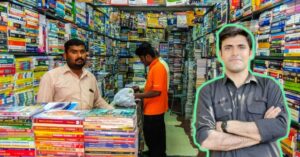
IFS Officer Shares Pro Tips on How to Read Books Efficiently for UPSC, IIT-JEE, GATE & Other Exams
Preparing for IIT, GATE, or UPSC? IFS officer Himanshu Tyagi, who is also an alumnus of IIT Roorkee, shares how to read books effectively to retain important information while preparing for competitive exams.
Read more >
“Education is something we need in every single thing we do and illiteracy is a lack that we all need to overcome,” concludes Puneeta, who heads the Shahpur Khalwapatti’s Kishori Sangathan as the chairperson.Edited by Yoshita Rao
This story made me
-
97
-
121
-
89
-
167










